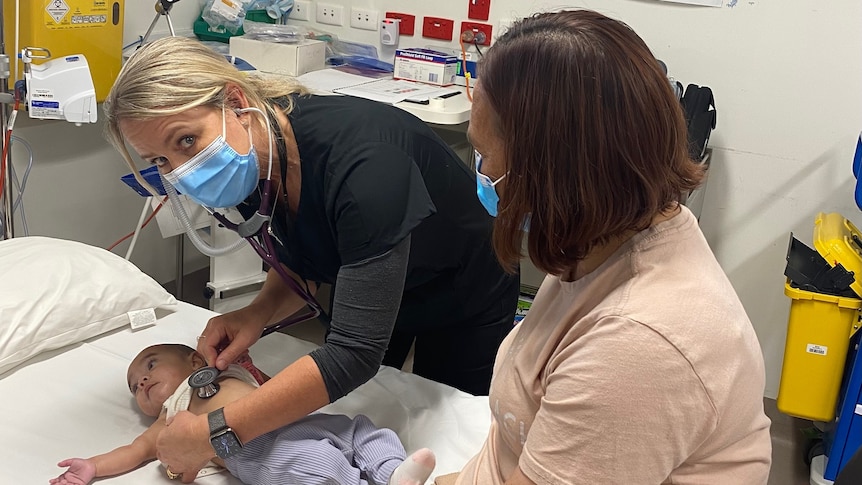The cost of a short-term locum doctor contract has increased 50 per cent in a year, according to rural doctors.
Key points:
- Only around 15 per cent of medicine graduates choose to be GPs, compared to around 50 per cent years ago
- The rural doctors’ president says the Medicare rebate has not kept up with inflation
- Assistant Minister for Regional Health Emma McBride has blamed the former Coalition government for cuts to Medicare
Locum contracts are being offered at $3,500 a day in Launceston, $3,000 a day in Bathurst and Mount Gambier, and $280 an hour in Broken Hill.
Karyn Matterson works locum contracts around the country and so far this year has worked from Clermont in Queensland to Collarenebri and Corowa in New South Wales, and from Tasmania to Palm Island off Townsville.
“Locum doctors, both in the city and in the bush are in high demand,” Dr Matterson said.
“It’s increased exponentially as the general practitioner shortage has become more visible across Australia.”
Dr Matterson saw a connection between the decreasing Medicare rebates for GP appointments in real terms and the increase in the need for locums, as GP clinics around the country struggled to find staff.
“That is putting pressure on emergency departments across Australia because we’re seeing a lot more GP-type presentations in hospitals,” she said.
“The people who are presenting are actually sicker than what we’ve seen in primary health care in the past because they can’t get into doctors.”
‘Problem will get worse’ without reform, says doctor
The Royal Australian College of GPs said the cost of Medicare rebates for most GP appointments had risen by 1.6 per cent.
That’s well short of the most recent inflation figure of 6.1 per cent.
Matt Masel, president of the Rural Doctors Association of Queensland, said it reflected a lack of longer-term planning over time.
Dr Masel is a partner in a GP practice in Goondiwindi, almost 300 kilometers south-west of Brisbane. He said the increasing cost of locums was a sign the health system was not working.
“We’re seeing doctors coming out of medical schools where 50 per cent used to choose general practice and only about 15 per cent do now,” he said.
“That means this problem is only going to be worse in a few years’ time unless we really make those choices to go into general practice and rural practice more attractive.”
Dr Masel said the increasing cost of locums would put it out of reach for many GP clinics in the bush.
“Without them, I couldn’t plan to attend my child’s graduation or other family events or just have a break when I really need a break,” he said.
“So locums are really important.”
Most locum contracts are being offered by state-run health services, but Dr Masel said the increased cost would mean less money could be spent elsewhere.
In a statement, Assistant Minister for Regional Health Emma McBride attacked the previous government saying the Coalition cut Medicare in its nine years in power.
Ms McBride said the Albanese government will spend $135 million to create 50 bulk-billing clinics across Australia, which, she argued, would take pressure off hospital emergency departments and help Australians access care when they needed it.
“This will mean practices can recruit GPs from a wider pool of doctors, it will take the pressure off hospital emergency departments, and it will help Australians access the care they need when they need it,” she said.
.

